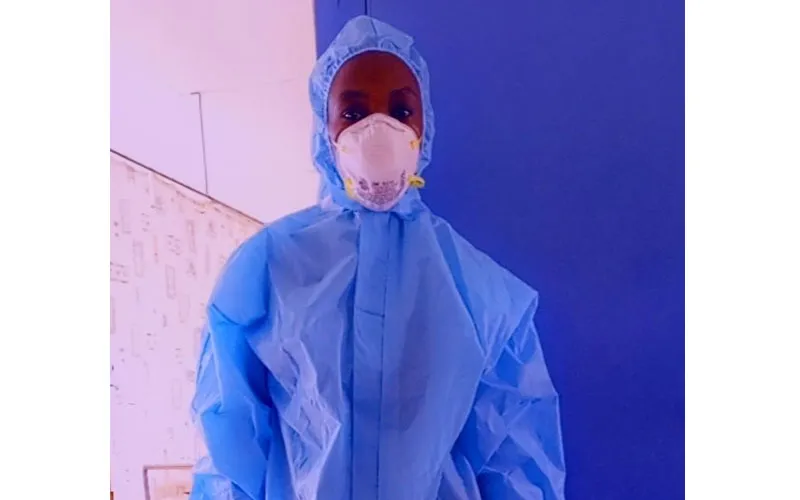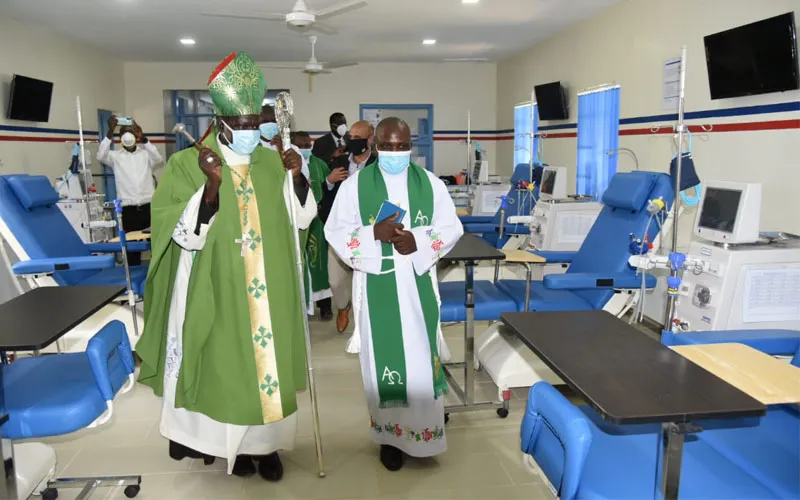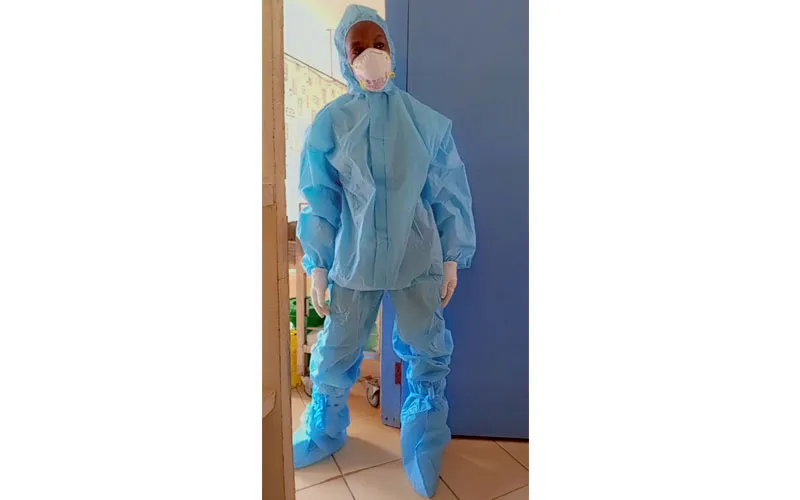The donation of PPEs by the Kenyan bank enhanced the safety of the medical staff, Fr. Odhiambo said, and explained, “If the medical staff dealing with the patients who are infected are well protected, they are protecting the fellow staff members because in their interaction, then they are not exposing them to the virus.”
The protection is extended to family members, he said, adding in reference to the medical staff at the Catholic facility, “after work, they return to their families, safe in terms of infection.”
“The donation of the PPEs meant that there is a reduction in the cost of care for the infected patients in the isolation; the money that was used to take care of this cost is easily rewired to other expenditures around about the care of the patients because the treatment protocol had some drugs that were pretty expensive,” Fr. Odhiambo explained.
He continued, “When a patient is cushioned on account of the PPEs, then the money available can easily be channeled to the purchase of drugs that are necessary to attend to the symptoms that come with the COVID-19.”
The constant supply of PPEs “has made the situation manageable, compared to the initial situation when we were struggling amidst scanty resources,” Fr. Odhiambo reiterated and continued in reference to PPEs, “When they are available and they are being replenished on use, you simply give a report and request for a replenishment. So, you have no limit as to how and when you can put on the PPE; as long as there is a need, the staff will put on the PPE and proceed and attend to the patient that is before them.”
(Story continues below)
The donation of the protective equipment has also been helpful in the process of taking samples from patients, the Administrator of St. Mary’s Hospital told ACI Africa, and explained, “the person who goes to take the sample for testing the Coronavirus has to be fully donned with the full PPEs.”
“So, with the PPEs, even the laboratory staff taking the samples will easily accept to go and take the sample because they have the necessary protection as they do the sample taking,” Fr. Odhiambo further said about the impact of the Equity bank donation to the Catholic health facility.
The continuous supply of PPEs is expected to continue for the next 18 months, he said, adding that at the expiry of the period, the situation of the pandemic will be reviewed in view of extending “the donation as long as the threat still exists.”
 Medical staff at St. Mary's Mumias Hospital donned his/her PPE. Credit: St. Mary's Mumias Hospital/Kakamega Diocese
Medical staff at St. Mary's Mumias Hospital donned his/her PPE. Credit: St. Mary's Mumias Hospital/Kakamega Diocese
“We liaise with Equity bank, Mumias branch. The coordination is done by the branch and we have an office we report to,” Fr. Odhiambo said about the administration of the supply of PPEs, and added, “Since the donation came in through KCCB, we also report through KCCB.”
St. Mary's Mission Hospital Mumias of the Diocese of Kakamega is among the hundreds of health facilities run by the Catholic Church in Kenya under the auspices of the Catholic Health Commission of Kenya (CHCK).
Information on KCCB website indicates that through CHCK, the Catholic Church “runs close to 30% of all healthcare facilities in Kenya. The Church has an expansive network that consists of 451 health units (69 hospitals, 117 health centers, 14 Medical Training Colleges and 251 Dispensaries) and more than 46 Community Based Health and Orphaned and Vulnerable Children (OVC) Programs.”
ACI Africa was founded in 2019. We provide free, up-to-the-minute news affecting the Catholic Church in Africa, giving particular emphasis to the words of the Holy Father and happenings of the Holy See, to any person with access to the internet. ACI Africa is proud to offer free access to its news items to Catholic dioceses, parishes, and websites, in order to increase awareness of the activities of the universal Church and to foster a sense of Catholic thought and culture in the life of every Catholic.




 Medical staff at St. Mary's Mumias Hospital donned his/her PPE. Credit: St. Mary's Mumias Hospital/Kakamega Diocese
Medical staff at St. Mary's Mumias Hospital donned his/her PPE. Credit: St. Mary's Mumias Hospital/Kakamega Diocese
 Medical staff at St. Mary's Mumias Hospital donned his/her PPE. Credit: St. Mary's Mumias Hospital/Kakamega Diocese
Medical staff at St. Mary's Mumias Hospital donned his/her PPE. Credit: St. Mary's Mumias Hospital/Kakamega Diocese Medical staff at St. Mary's Mumias Hospital donned his/her PPE. Credit: St. Mary's Mumias Hospital/Kakamega Diocese
Medical staff at St. Mary's Mumias Hospital donned his/her PPE. Credit: St. Mary's Mumias Hospital/Kakamega Diocese


